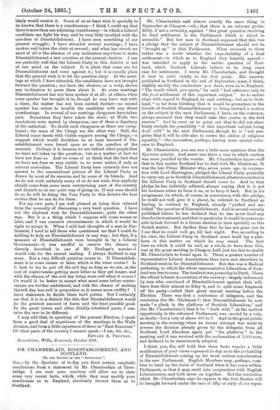MR. CHAMBERLAIN, DISESTABLISHMENT, AND SCOTLAND.
rTo THE EDITOR OF THE " SPECTATOE."1 &a,—In the Spectator of to-day you draw certain emphatic conclusions from a statement by Mr. Chamberlain at Trow- bridge. I am sure your courtesy will allow me to state some very recent facts, which, while they may modify your conclusions as to England, absolutely reverse them as to Scotland. Mr. Chamberlain said almost exactly the same thing in September at Glasgow,—viz., that there is an extreme proba- bility, if not a certainty, against "this great question receiving its final settlement in the Parliament which is about to assemble." But few men in Scotland supposed that this was a pledge that the subject of Disestablishment should not be "brought up" in that Parliament. What occurred to them rather was a doubt whether the improbability of a final settlement—in which as to England they heartily agreed— was intended to apply to the earlier question of Scot- land, which Scottish Liberals believe to be long since ripe for settlement. I wrote Mr. Chamberlain, and thought it beet to refer chiefly to the first point. His answer, published in Scotland in the end of September, must, I think, slightly modify the conclusions you draw, even as to England. "The words which you quote," he said, "had reference only to the final settlement of this important subject." As to earlier steps with regard to England, he said nothing ; but as to Scot- land, "so far from thinking that it would be premature in the friends of Scottish Disestablishment to bring forward a motion on the subject in the next Parliament, I have, on the contrary, always assumed that they would take this course in the first session." And he went on to point out that he did not abso- lutely exclude the possibility "of this important subject being dealt with" in the next Parliament, though he is "not san- guine that it will be able also to crown the edifice of religious equality,"—the coronation, perhaps, having more special refer- ence to England.
Mr. Chamberlain, you see, was a little more cautions than the Spectator admits. And never was there a case in which caution was more justified by the results. Mr. Chamberlain knows well that in this matter Scotland has to deal with Mr. Gladstone. It was the late Prime Minister who, seven years ago, in conjunc- tion with Lord Hartington, pledged the Liberal Party generally to carry out, as to Scottish Disestablishment, whatever conclusion the Liberal Party in Scotland should come to. And to that pledge he has faithfully adhered, always saying that it is not his business either to force it on, or to keep it back. But in his programme (in which, of course, in consistency with this pledge, he could not well give it a place), he referred to Scotland as having, in contrast to England, already "probed and un- folded" the question of Disestablishment. And in several recently published letters he has declared that he has never fixed any time forits treatment, and that in particular it would be unreason- able to look forward to a future election to turn specially on this Scotch matter. But farther than this he has not gone, nor do I see that he could well go, till last night. For, according to his view, the Liberal Party in Scotland must itself lay a plat- form in this matter on which he may stand. The first time on which it could be said, as a whole, to have done this, was at the great meeting in Glasgow, held just too late to enable Mr. Chamberlain to found upon it. There, a greater number of
representative Liberal Associations than have met elsewhere in Scotland went in for Disestablishment. But this was a Radical gathering, to which the whole representative Liberalism of Scot- land was free to come. The final test was yesterday in Perth. There the official Liberal Association of the country—largely influenced by men who, convinced of Disestablishment against their will, have done their utmost to delay it, and to split some fragment off the party—called their great annual meeting before the
Election. There was first a conference of delegates, and the
resolution (for Mr. Gladstone ?) that Disestablishment be now made "a plank in the platform of Scottish Liberalism," and.
(for Mr. Chamberlain ?) that it be "dealt with" at the earliest opportunity in the reformed Parliament, was carried by a vote, no doubt—but a vote of above 400 to 7. And in the great public meeting in the evening, when an insane attempt was made to reverse the decision already given by the delegates from all Scotland, Lord Aberdeen again put "the platform" to the meeting, and it was received with the acclamation of 3,000 men, and declared to be unanimously adopted.
I think you, Sir, will hold that these facts require a little modification of your views expressed to-day as to the probability of Disestablishment coming up for most serious consideration in the new Parliament. English Members may, perhaps, com- bine to bank up the claim of Scotland when it has come within Parliament, so that it may swell into conjunction with English Liberationism, and both move on together. But the resolution which Mr. Chamberlain says he expects in the first Session will be brought forward under the care of fifty or sixty of our repre- sentatives, who will represent as to it that official " platform " upon which Scottish Liberalism now invites Mr. Gladstone to



































 Previous page
Previous page